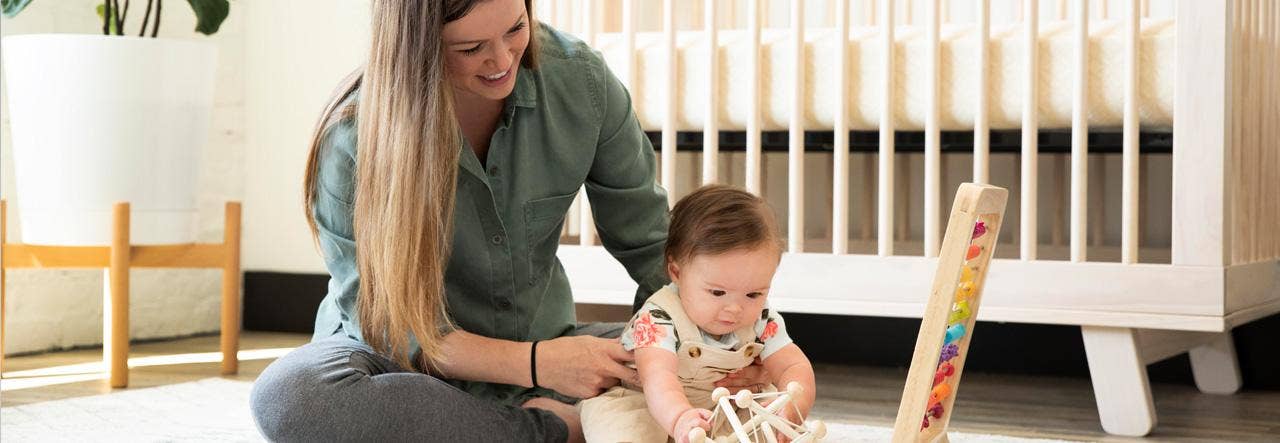This month is Baby Safety Month — a whole month dedicated to remembering and sharing tips for keeping your bundle of joy safe and sound. At Naturepedic, we believe the health and safety of your child should be non-negotiable, and we also understand how challenging it can be to baby-proof everything in your child’s life.
Sometimes, it can seem like there are a thousand things to remember when it comes to keeping your baby safe. From covering electrical sockets to figuring out how to baby-proof the bathrooms, taking every precautionary measure to protect your little one is an important part of good parenting.
But baby safety goes beyond just protecting them from physical harm in the home; it also includes your baby’s overall health, which means creating holistic habits and making health-minded choices for them as they grow.


1. Think Twice About Furniture
To ensure a toxic-free sleep environment for your little one, it may be worthwhile to consider how the furniture in your baby’s nursery was made. Are the furniture pieces certifiably safe and free from harmful chemicals? Thinking critically about where your baby’s crib, rocking chair, or changing table came from might raise some poignant questions. Taking the steps to adequately baby-proof the existing furniture in the home is important, too. Remember to add padding to all sharp corners!
2. Create a Safe Sleep Environment
It’s easy to think that your baby won’t or can’t suffocate from things like blankets or bumpers in their crib, but it’s just not worth the risk. If you haven’t thought about the safety of your baby’s crib, a good place to start is with their crib mattress. Ensure the mattress has a snug fit by allowing for no more than two fingers between the mattress and the bars/side of the crib. An organic crib mattress cover is also important for keeping the crib clean and hygienic. Finally, keep small objects and toys out of your baby’s crib so that you don’t risk any choking hazards.
3. Get Into a Good Routine
Establishing a good sleep schedule for your baby is a key factor in their overall health and wellness. When you find the right routine, it will make everyone’s life safer—as the parents won’t be as over-tired and the babies’ development will be well-supported. While your baby sleeps, they replenish their energy, store memories, and develop brain tissue — all key factors in their safe development. Routines support a baby’s healthy growth, so finding the one that works for your family is essential.
4. Install Your Baby's Car Seat Correctly
Car seats and seatbelts save lives, but only when they’re used properly. According to Parenting.com, some common mistakes that parents make during installation include: forgetting to use the tether, not putting enough weight on the seat while it’s being installed, not putting the baby’s seatbelts in lock mode, and routing the seatbelts incorrectly. If you’re unsure whether you installed the car seat correctly, have a qualified professional like a certified childhood passenger instructor or even a state trooper check it out.
5. Hide All Cords
Cords are very dangerous for babies because they are strangulation hazards. Make sure any window coverings, such as curtains or blinds, are cordless. If there are any cords, tie them up so that they’re near the top of the window. Other cords, including ones from your baby monitors, cell-phone chargers, and lamps, should also be kept out of reach of your baby at all times. Doing so will prevent potential injuries from electrocution.
6. Choose Organic Whenever Possible
Until there is more regulation on commonly misused and “greenwashed” terms, parents can make a concentrated effort to choose healthier, safer baby products whenever possible. Rethinking whether the everyday baby items that you buy, such as diapers, bath products, and even food, are made with potentially harmful chemicals is a good place to start. (Hint: Most are!) Choosing certifiably organic products as often as you can is the safest solution to exposing your baby to toxic chemicals or allergens.
7. Block Your Staircase
Nearly 8,000 children are treated each year in emergency rooms because of falling-related accidents. To keep your baby from falling while crawling or standing near the stairs, install a baby gate. Blocking off your staircase will ensure that your baby never comes close to falling down the stairs.
8. Never Leave Your Baby Unattended
In general, parents really shouldn’t ever leave babies on their own. Even if you’re just taking out the trash for a minute, all it takes is one split second for dangerous consequences to occur, like choking on spit-up or rolling over face-first. Making sure your baby is never left unattended is especially critical if you have pets. While you can always teach older children to be gentle with pets, babies cannot be trusted around animals and might end up pulling or grabbing your pet in the wrong way.
9. Check Out Your Detectors
Smoke alarms that are installed properly and well-maintained can play a vital role in reducing your family’s risk of fire deaths and injuries. Fires are surprisingly common, and when they occur, smoke spreads fast. Having working smoke alarms will give you time to get your family out. Moreover, being exposed to small amounts of CO over a long period of time can lead to various health hazards. This is why checking your smoke and carbon monoxide detectors multiple times a year is key.
10. Follow Your Parental Instincts
Last but not least, trust your instincts as a mom or dad. if something doesn’t feel right, it probably isn’t. You don’t need to consult the baby books or websites every time there’s an issue. Following your instincts can oftentimes be your safest bet. After all, you know and ultimately determine what’s best for your baby, so remember that!
 BABY
BABY  KIDS
KIDS  ADULT
ADULT  LEARN
LEARN  STORES
STORES 